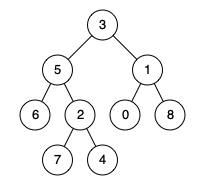leetcode【每日一题】236. 二叉树的最近公共祖先 Java
我的leetcode代码都已经上传到我的git仓库https://github.com/ragezor/leetcode
题干
给定一个二叉树, 找到该树中两个指定节点的最近公共祖先。
百度百科中最近公共祖先的定义为:“对于有根树 T 的两个结点 p、q,最近公共祖先表示为一个结点 x,满足 x 是 p、q 的祖先且 x 的深度尽可能大(一个节点也可以是它自己的祖先)。”
例如,给定如下二叉树: root = [3,5,1,6,2,0,8,null,null,7,4]
示例 1:
输入: root = [3,5,1,6,2,0,8,null,null,7,4], p = 5, q = 1
输出: 3
解释: 节点 5 和节点 1 的最近公共祖先是节点 3。
示例 2:
输入: root = [3,5,1,6,2,0,8,null,null,7,4], p = 5, q = 4
输出: 5
解释: 节点 5 和节点 4 的最近公共祖先是节点 5。因为根据定义最近公共祖先节点可以为节点本身。
说明:
所有节点的值都是唯一的。
p、q 为不同节点且均存在于给定的二叉树中。
想法
这道题有两种方法,分别是递归和实现父指针。
递归
树的规律性问题自然想到递归没什么好说的。
假设我们实现了这个函数好吧,如果我们实现了它。
那么我可以对左右子树分别调用这个函数,使得找到现在对应的p,q的最近公共祖先节点。
然后如果p,q都非空,就意味着确实找到了。并且因为左右子树的最近公共祖先,肯定就是这个树呀。
那么返回root即可,相反如果返回值左为空,那么证明两个都在右边,那么返回右子树。
返回值右为空同理。
代码对应后边的lowestCommonAncestor函数
父指针
因为题干上说了所有节点的值都是唯一的。
那么给定一个节点值,我们就可以一对一找到父亲节点。
那么先dfs,把每个节点对应的父亲节点放入map。
然后再从p向上找,每遍历到一个父亲节点,那么就把这个节点放入set里。
如果q已经存在于这个set,证明q是p的最近祖先节点,返回即可
然后再q往上找。
都没找到,ok 返回null
代码对应后边的lowestCommonAncestor2函数
Java代码
package daily;
import java.util.HashMap;
import java.util.HashSet;
import java.util.Set;
public class LowestCommonAncestor {
//map存对应的父节点
HashMap<Integer,TreeNode> map=new HashMap<>();
//set存访问过的节点
Set<Integer> visited=new HashSet<>();
public static class TreeNode {
int val;
TreeNode left;
TreeNode right;
TreeNode(int x) { val = x; }
}
public TreeNode lowestCommonAncestor(TreeNode root, TreeNode p, TreeNode q) {
//空处理
if(root==null){
return null;
}
//root就是目标
if(root==p||root==q){
return root;
}
//左右递归
TreeNode left=lowestCommonAncestor(root.left,p,q);
TreeNode right= lowestCommonAncestor(root.right,p,q);
//左空返回右子树
if(left==null){
return right;
}
//右空返回左子树
else if(right==null){
return left;
}
//两边都有就是找到了
else {
return root;
}
}
public TreeNode lowestCommonAncestor2(TreeNode root, TreeNode p, TreeNode q) {
dfs(root);
//往上找,把p的放进去
while(p!=null){
visited.add(p.val);
p=map.get(p.val);
}
//q的值在p的父亲里
while (q!=null){
if(visited.contains(q.val)){
return q;
}
q=map.get(q.val);
}
return null;
}
//dfs 把父节点对应搞定
public void dfs(TreeNode root){
if(root.left!=null){
map.put(root.left.val,root);
dfs(root.left);
}
if(root.right!=null){
map.put(root.right.val,root);
dfs(root.right);
}
}
public static void main(String[] args){
TreeNode node=new TreeNode(3);
node.left=new TreeNode(5);
node.left.left=new TreeNode(6);
node.left.right=new TreeNode(2);
node.left.right.left=new TreeNode(7);
node.left.right.right=new TreeNode(4);
node.right=new TreeNode(1);
node.right.left=new TreeNode(0);
node.right.right=new TreeNode(8);
LowestCommonAncestor lowestCommonAncestor=new LowestCommonAncestor();
TreeNode res=lowestCommonAncestor.lowestCommonAncestor(node,node.left,node.left.right.right);
TreeNode res2=lowestCommonAncestor.lowestCommonAncestor2(node,node.left,node.left.right.right);
System.out.println(res==null? null:res.val);
assert res != null;
System.out.println(res2==null? null:res.val);
}
}
